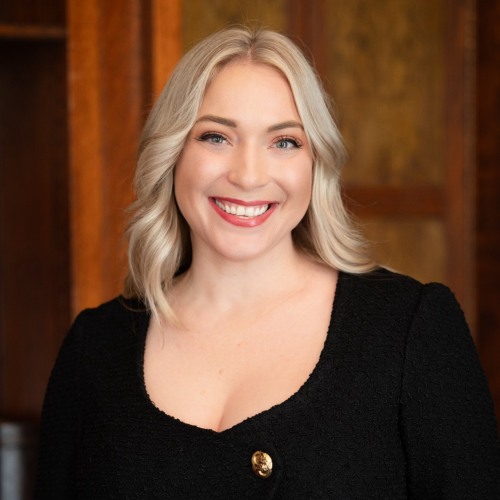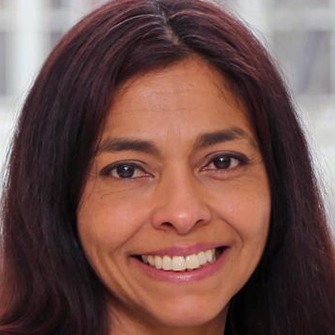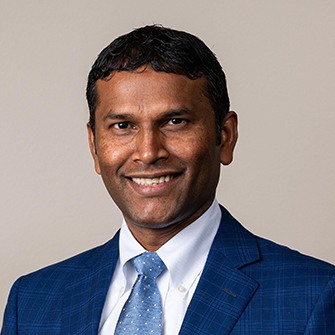Breast & Gynecologic Cancer
Leadership
-

Stephanie Graff, MD
Associate Director for Global Oncology and Policy -

Cara Mathews, MD
Associate Professor of Obstetrics and Gynecology -

Michelle Dawson, PhD
Associate Director for Cancer Research Training and Education Coordination, Assistant Professor of Molecular Biology, Cell Biology and Biochemistry
Dr. Graff is a nationally recognized breast oncologist, clinical trialist, and advocate for advancing cancer care. She is a graduate of the ASCO Leadership Development Program and serves in multiple national leadership roles, including on the steering committee of the American Cancer Society’s National Breast Cancer Roundtable. She is an active member of SWOG and Alliance (NCTN), a frequent public speaker, and a contributor to the Dr. Susan Love Breast Book, 7th Edition.
Her research interests include oncology drug development and clinical trials, hormone receptor–positive and triple-negative breast cancer, breast cancer genomics, metastatic and rare breast cancers, and addressing health disparities. She is also deeply engaged in narrative medicine, serving on the Art of Oncology Editorial Board of Journal of Clinical Oncology and as faculty in Brown’s Arts & Medicine Track.
Dr. Cara Mathews is a gynecologic oncologist and Associate Professor of Obstetrics and Gynecology at Brown University. She serves as the Director of Gynecologic Oncology Research and is a leader in developing translational studies for gynecologic cancers. Dr. Mathews completed her residency at Women & Infants Hospital/Brown University and her fellowship in gynecologic oncology at the University of Oklahoma. Her work focuses on improving clinical outcomes for women with gynecologic malignancies through research and clinical innovation.
Dr. Michelle Dawson is a biomedical engineer and cancer researcher whose work bridges engineering and fundamental biology. She earned her PhD in Chemical & Biomolecular Engineering from Johns Hopkins University and completed a postdoctoral fellowship in Radiation Oncology at Massachusetts General Hospital. At Brown, Dr. Dawson is Associate Professor of Molecular Biology, Cell Biology, and Biochemistry and Assistant Professor of Engineering. She also serves as Co-Director of Graduate Studies in Biomedical Engineering and Associate Director for Cancer Research Training and Education at the Legorreta Cancer Center. Her NIH- and NSF-funded research focuses on how aging and therapeutic interventions shape the tumor microenvironment, with a current emphasis on metabolic changes in invasive ovarian cancer.
About TRDGs
Translational Research Disease Groups (TRDGs) provide a regular forum for advancing translational cancer research and fostering collaboration across disciplines. Eight TRDGs have been established at the Legorreta Cancer Center, each organized around a specific cancer type.
The Breast Cancer TRDG brings together a multidisciplinary team of researchers and clinicians, including experts in:
- Hematology/Oncology, Radiation Oncology, and Surgical Oncology
- Pathology and cancer biology
- Genetics, population science, biostatistics, and bioinformatics
- Fellows, residents, and student trainees
Our meetings create opportunities to:
- Develop and prioritize new translational research directions
- Share resources and expertise across Brown and affiliated hospitals
- Launch collaborations that can lead to pilot funding, extramural grant applications, and publications in high-impact journals
- Advance investigator-initiated clinical trials and translational protocols
TRDGs meet every 2–3 months, typically at the Brown University Molecular Medicine Building (70 Ship Street) or at an affiliated hospital site. Meetings feature a mix of roundtable discussions and designated speakers, with ample time for feedback and collaborative planning. Minutes are shared internally with group members.
Membership is open and evolving. We welcome faculty, fellows, residents, and students with an interest in translational breast cancer research to join our efforts.
Standing Agenda for TRDG Roundtable Meetings
- Review ongoing translational research and investigator-initiated trials
- Identify collaboration opportunities based on current science and feasibility
- Discuss biomarkers, tumor signaling pathways, and drug development strategies
- Exchange information on funding opportunities (e.g., P01s, SPOREs, or other translational grants)
- Highlight progress through focused presentations by investigators or subgroups
- Leverage institutional resources (genomics, tissue banks, clinical trial infrastructure, tumor boards)
- Engage trainees and early-career researchers in translational projects
- Form working groups to advance projects toward new protocols, grant submissions, and publications
Contact:
For more information or to join the Breast Cancer TRDG, please contact Attila Seyhan, PhD.
-

Attila Seyhan, PhD
Director of Operations - Translational Oncology, Legorreta Cancer Center, Adjunct Associate Professor of Pathology and Laboratory Medicine -

Sendurai Mani, PhD
Director for Translation, Asoociate Director for Translational Oncology, Legorreta Cancer Center